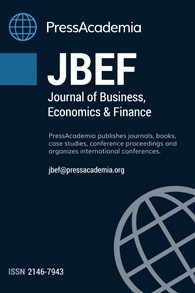QUALITIES REQUIRED BY SME BUSINESSES IN TECHNICAL STAFF IN CASE OF CRISIS: WOODWORKING INDUSTRY SAMPLE
Owners and/or managers of the small enterprises who are obliged to take the responsibility of making decisions at times of crises due to the very nature of these enterprises should have a perspective of strategic thinking and should be able to make an accurate analysis of the internal and external environments in order to overcome the crisis with minimal loss and damage. Sought qualifications are having information in automatisation with computer programs (Autocad, CAD/CAM, Solidworks etc.), practical technical detail and construction, having an innovative and entrepreneur structure, being able to make innovative design and produce solutions, knowing more than one foreign language, and being able to use CNC machines. It is seen that the enterprises in question have taken precautions for improving the quality of the innovative products and increasing the labour productivity as well as for reducing the costs in such periods.
Keywords:
SME woodworking, production,
___
- Aktan, C.C. 2005, ‘Information Management in the Information Age’, Lens Publications, MESS, April.
- Anonymous 1, 2015, http://www.haberler.com/mobilya-sektorunde-kalifiye-eleman-bulunamiyor-3625462-haberi/(Access Date 17.02.2015).
- Anonymous 2, 2016, http://www.izto.org.tr/portals/0/iztogenel/dokumanlar/isletmelerde_kriz_yonetimi_ii_h_baran_26.04.2012%202309-02.pdf (Access Date: 06.04.2016).
- Anonymous 3, 2015, http://tiponaybelgesi.net/projedt/377-kobilerin-karsilastiklari-isletmecilik-sorunlari.html (Access Date: 21.05.2015) Anonymous 4, 2015, http://www.orsiad.com.tr/mobilya-sektorunun-sorunlari-ve-cozum-onerileri.html (Access Date 10.01.2015).
- Burdurlu, E. 2004 ‘Administrative Personnel Preferences of Turkey Furniture Industry’, G.U. Journal of Science, ISSN 1303-9709, 17(1): 85100.
- Colak, M. 2013, ‘Being affected from crisis: Case of furniture industry in Turkey’, African Journal of Business Management, Vol. 7(1), 78-84, 7 January, 2013.
- Icli, G, 2007, ‘Vocational School of Business Alumni Related Opinion and Expectations’, Marmara University, I.I.B.F. Journal, Vol: XXIII, Num: 2, Istanbul.
- Kaya, Y.K. 2004, ‘Education Management Theory and Practice in Turkey’, TODAIE Publications, Ankara.
- Kaygin, B. & Tankut, A.N. and Cayli, M. 2008, ‘The structural analysis of small and medium size furniture enterprises in Turkey based on production, capacity use and working environment’, African Journal of Biotechnology, Vol. 7 (24), pp. 4628-4634, 17 December 2008.
- MBSDA, 2013, ‘Middle Black Sea Development Agency’, Wood Products and Furniture Industry Report, Vol:27, Samsun.
- Miller, N.J. & Besser, T.L., Gaskill, L.R. and Sapp, S.G. 2002 ‘Community and Managerial Predictors of Performance in Small Rural US Retail and Service Firms’, Journal of Retailing and Consumer Services, Vol: 10 (4), 215-230.
- Sakarya, S. 2006, ‘Evaluation Report for the Furniture Industry Middle Anatolia Exporters’, Union Secretariat, January Issue, pp.1-51.
- Tasındi, A. S. 1999, “Determination of training needs in Central and Upper Management”, Human Reseource Journal, March.
- Tutar, H. 2000, ‘Management in Crisis and Stress Environment’, Hayat Publishing, 14, Istanbul.
- TUCCE, 2012, Turkish Union of Chambers and Commodity Exchanges, Assembly of the Sector Report Turkey Furniture Products, V:18, Ankara.
- Ulukan, C. 2005, ‘Perspectives of Institutionalization of Entrepreneurs and Professional Managers’, Magazine of Social Sciences, 2, Turkey.
- Yayın Aralığı: Yılda 4 Sayı
- Başlangıç: 2012
- Yayıncı: PressAcademia
